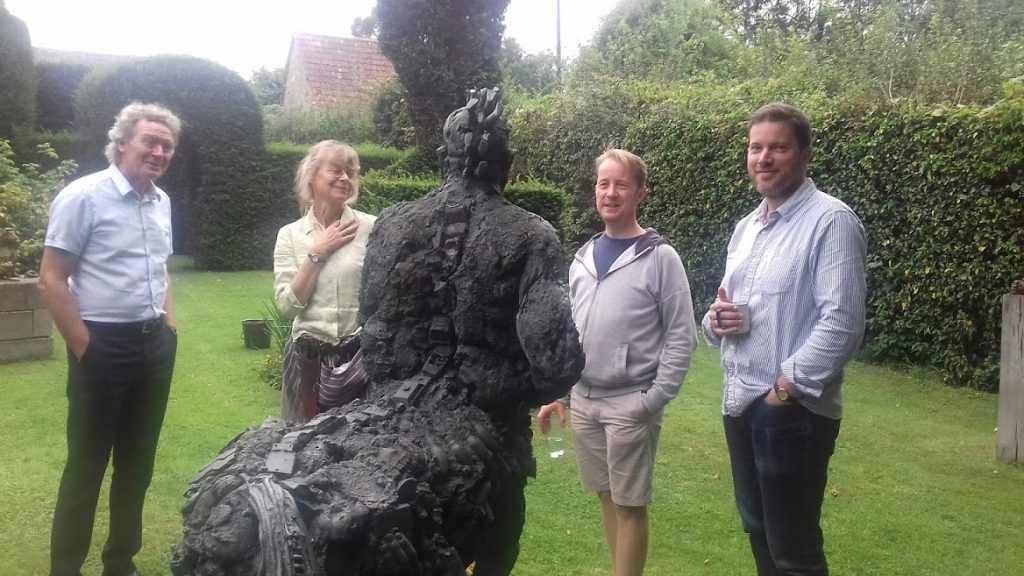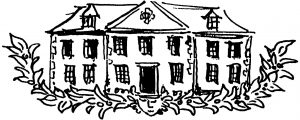September: For a long time we have been looking for venue that could match Monteconero for its splendid situation, beautiful surroundings, a place where a group can stay together for a week cut off from the outside world and wallow in music. Now we have found one: Castello di Gargonza, a fortified mediaeval village surrounded by a vast hunting estate in the Chianti hills of south Tuscany, between Siena and Arezzo. The old houses are now run as a hotel by the charming and cultured family that has owned it over the generations. We can sing in the church and also the frantoio or olive mill, which has been made into a comfortable rehearsal room. The inaugural Lacock course will be directed by Patrick Craig and will run from 15 to 21 April. The repertoire will range from Willaert and Manchicourt to Morten Lauridsen. All the details are at www.lacock.org.
On my way to Monteconero this June, I headed for the shortest queue for the passport check at Pisa airport, but soon realise that, as the passengers at the desk were a large family with the mother in a burqa and the father having some sort of argument with the official, it might not be the fastest moving. Another Englishman behind me, whose appearance suggested that he had lived life to the full, had the same thought and we went and joined another, by this time much longer, queue. After a few moments he said, “Excuse me, but I’ve been trying to place you. Are you perhaps a university lecturer or a representative of The British Council? It’s not just your dress [stone linen suit, by this time rather crumpled, round gold-framed spectacles], but also your general demeanour. Am I in the right sort of area?” I felt flattered, though I would have been happier, at my age, with professor rather than lecturer. I had just enough time to assure him that he was, before I was beckoned forward.
Last week I had a text from Eamonn Dougan to say that The Sixteen were singing in Lacock that evening. I had heard nothing about it so couldn’t quite believe it wasn’t a cruel hoax until I had phoned their office to check. Indeed they were – a private concert sponsored by a City magnate who had recently come to live in the village. Harry Christophers and all the rest came to tea after the rehearsal. With their encouragement we gate-crashed the performance. The vicar assumed we were friends of the patron and ushered us to the best reserved seats at the front of the church. The performance was of course mesmerising and Harry was charm itself: no wonder corporate sponsorship has poured into his organisation over the decades.

Finally, if you have been to Lacock and met Deborah and her work, you may be interested to know she has some pieces in a major exhibition in Chester cathedral, which continues until mid October. Here’s what the critic Georgina Coburn had to say about it.
‘One of my favourite meditations on the nature of Nature was Deborah van der Beek’s series of bronzes a little larger than life size; Glaring Cat, Cat Catching Bird, Stalking Cat prowling the inner passageway of the Garth or garden courtyard. Their open forms feel like reconstructed debris, reminiscent of desiccated cats deliberately placed inside walls of buildings for protection. Here van der Beek highlights the darker, predatory aspects of their nature. These feline forms are animated by encrusted three dimensional lines of a first drawn response, capturing the artist’s ambivalence towards their untamed hunting prowess. However, as creatures of the earth they resist moral judgement, complete and sacred in their perfected design.’
June: We are very lucky to have a solid core of regular supporters, with some of your allegiances dating back to the last century. We are continually grateful to you all, especially those of you who have passed the word on to other singers or have recommended new venues or conductors. Lacock functions as a club, but we are alert to the dangers of cliqueyness and are always ready to welcome new members. Last year’s bring-a-man scheme has been a great success, so we repeat the offer: anyone receiving this newsletter may recommend a male singer not previously known to us (that is to say, not already on the mailing list) for a place on a course free of charge, as long as he fulfils the criteria for that course.
You may have noticed that some of our courses are for ‘invited singers’. The details are not put on the web site but there is not meant to be anything secret about them. The sort of people we invite are those that seem to be natural leaders of their sections, the ones that get asked to sing short solo passages or would be happy to sing in a one-to-a-part semi chorus. That generally means they have had some vocal training and are reliable readers. The ‘music parties’ are generally smaller than the other courses. The cadre of invitees is always changing: many newcomers are recommended by people already in the group, but you are also free to suggest yourself. If you think you would fit the bill and would like to be invited to one, just let us know.
Years ago when Andrew was living in London he had a friend in the unusually fortunate position of having a music room that seated 200 a stone’s throw from Bond Street tube station. Together they put on a run of lunchtime concerts featuring among others Emma Kirkby and the Hilliard Ensemble. The year was 1979 and the series opened with Alfred Deller; he died a few weeks later in Bologna, so that was his last London appearance. Having been out of touch for almost four decades, the friend sent us an email a few weeks ago, suggesting a new series this autumn – probably Thursday lunchtimes in October and November. We’ll let you know the programme when it is arranged. Expect a few familiar Lacock names!
January: Sorry that this is the first newsletter since June – something we can’t quite justify or explain. Apologies to those of you who thought they might have been struck off the list and also to those who didn’t notice the Monteconero details until it was too full.
We have just announced details of two new courses on the Lacock web site www.lacock.org. The first is the long-awaited Ludlow Summer School directed by Eamonn Dougan, assisted by Greg Skidmore, from 13th to 18th of August. This will take a glimpse into the brilliant musical world of 17th century Poland, when its wealth and prestige attracted musicians from all over Europe, particularly Italy. On the menu will be large-scale works for two, three or more choirs from the lavish musical establishments at the courts in Krakow and Warsaw, so as for last year’s Monteverdi Vespers there are places for choral singers, soloists, renaissance instruments of all sorts including continuo. Ludlow works brilliantly as a venue – a small town set in delightful countryside, with enough places to stay and eat, a foodie paradise, interesting independent shops and most importantly from our point of view, quite the most helpful and welcoming people running the church in the whole of Christendom.
The other is a return to Jimena de la Frontera in southern Spain from 17th to 22nd September for a week with Robert Hollingworth. The repertoire will be Spanish renaissance music and we hope to put some of the composers and specific works on the web site in the next few days. We were going to wait until then before sending out this newsletter, but since Robert let the cat out of the bag in an email to Fagiolini Friends last weekend there has been such clamour to enrol, we thought it would be only fair to let everyone know. Jimena is one of the famous pueblos blancos of southern Spain, but very much still an unpretentious working town where the relaxed rhythms of Andalusian life are undisturbed by intrusive tourism.
Since we last wrote in June we have had the wonderful Monteverdi Vespers week in Ludlow with a team of Lacock scholars soloists including a soprano from Veracruz in Mexico, and some brilliant young instrumentalists, the Schütz week in Trogir, which incidentally resulted in at least one of the scholars being offered work with Erik Van Nevel’s professional group Currende, and the winter school in which we gave the world premiere of Will Carslake’s ‘Duel of the White-Necked Ravens’ with stunning performances by Lacock scholars Catherine Shaw (soprano) and Sarah Latto (piano). In fact the Lacock Scholars’ star is still very much in the ascendant, with recent appearances at the Brighton Early Music Festival and an Advent concert to a packed audience at Lacock church in addition to their regular London performances at St Cuthbert’s, Earls Court. Their first CD, a selection of music from their last season, came out in November, with stunning performances of, inter alia, Mouton’s Nesciens Mater and a couple of movements from Duarte Lobo’s six-part Requiem. Copies of the CD (£10) are available from their web site www.lacockscholars.org.

